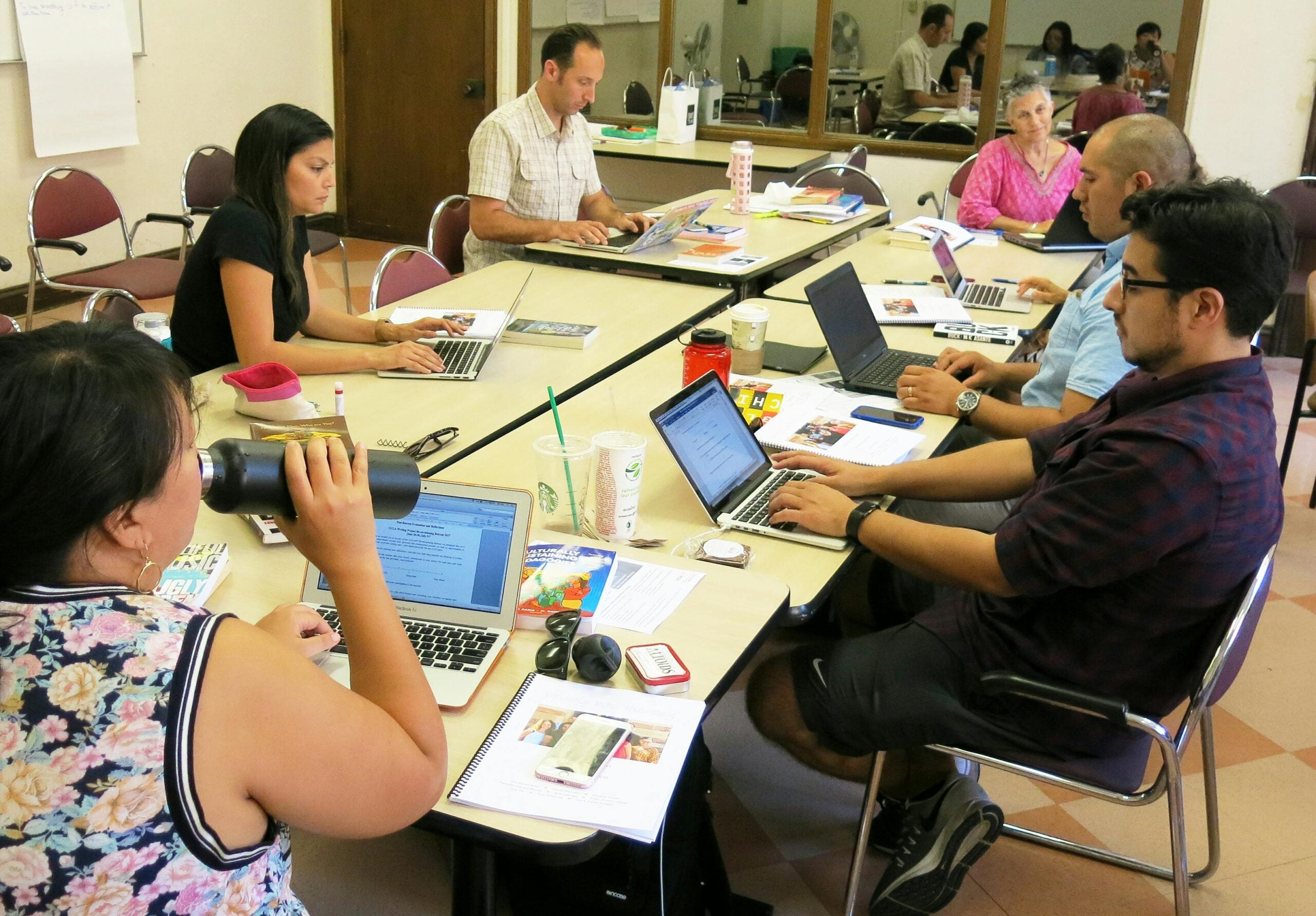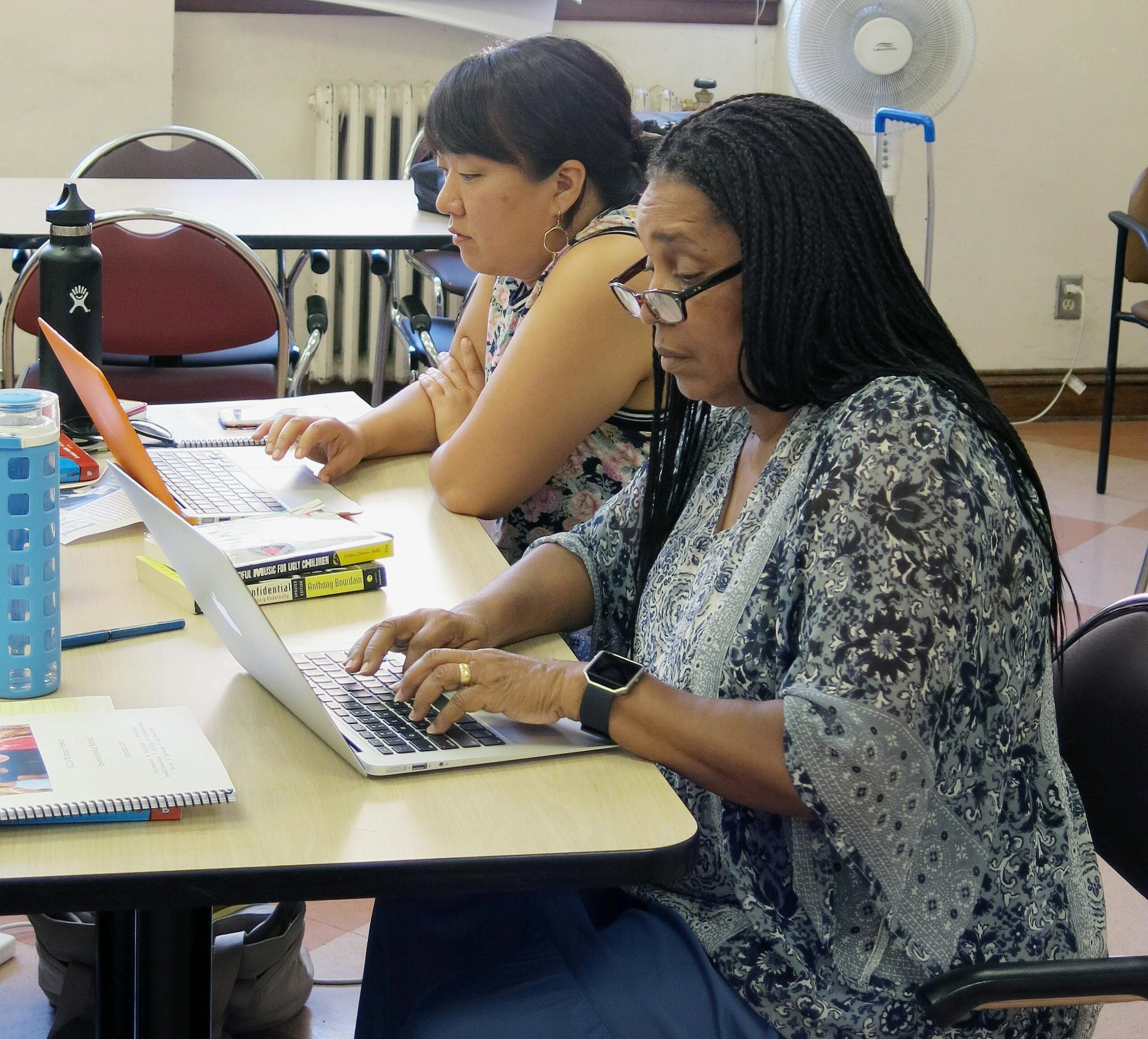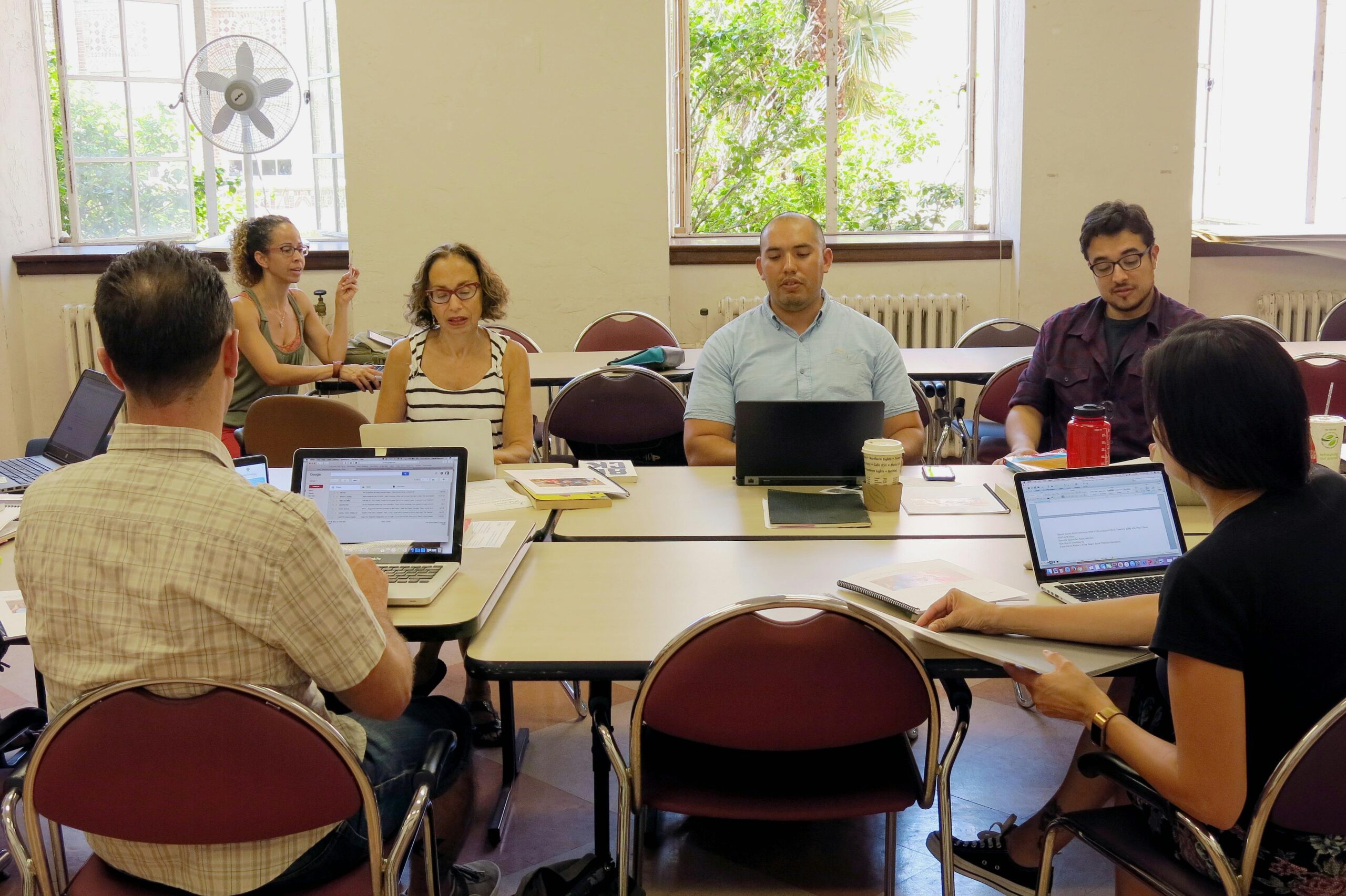While life may not actually begin at 40, the UCLA Writing Project is making the most of middle age. A Re-envisioning Retreat for WP Fellows this summer is paving the way for new innovation and leadership after four decades of propelling teachers and their students toward better writing, creativity, and social justice.
“The UCLA Writing Project has always been the source of the best professional development I’ve ever received — I’m always getting new ideas for strategies, texts, and ways to think about the profession,” says Jason Torres-Rangel, one of eight WP Fellows who were invited to participate in the Retreat, and an English teacher at UCLA Community School. “The UCLA Writing Project has always operated under the philosophy that teachers are to be valued as expert practitioners, investigators, tinkerers, and explorers, as opposed to vessels to implement a lock-step curriculum or preparation program.”
Since 1977, the UCLA Writing Project, a site of the California Writing Project as well as the National Writing Project, has invited 1,000 Fellows to participate in its signature “Summer Invitational,” where they collaborate for 100 hours in sharing promising writing methods, working on their own writing, and delving into multicultural literature and works that focus on issues of social justice. After this experience, some lead professional development sessions for teachers in local Los Angeles schools, present at conferences such as “With Different Eyes,” that provide guidance for both novice and professional teachers alike and/or participate in the monthly “Writers Anonymous” salon at the home of former WP co-director Jane Hancock. The Writing Project also provides summer workshops at UCLA for young writers from elementary grades through high school. This past summer, two workshops focused respectively on middle school students and on preparing high school students for college writing.

This year’s Re-envisioning Retreat, which took place June 26-July 5 at UCLA campus and at Shadow Mountain in Palm Desert, was by invitation to Writing Project Fellows who were either veteran WP leaders or newly minted in the 2016 Invitational. The eight-day retreat gave director Faye Peitzman and the Fellows, who teach at every level from K-12, a chance to re-examine the Writing Project’s professional development for teachers, bond as educators and authors, and of course, write and choose pieces to publish for a culminating anthology, which was created through 10-minute “Writing into the Day” exercises.
“We definitely wanted to make sure it was a nourishing and nurturing experience for the people who were participating – including me,” says Peitzman, who has co-led the Writing Project since 1983 and assumed its directorship in 1991. “We accomplished so much and got to know one another more intimately by writing and hanging out together. The heart of our time focused on pinpointing what our local schools want and need and how we can best serve teachers and their students.”
The guiding text for the Retreat was “Culturally Sustaining Pedagogy,” co-edited by H. Samy Alim, formerly a professor of education, anthropology, and linguistics at Stanford, and by Django Paris, professor at Michigan State University. This fall, Alim will join the UCLA Anthropology faculty.
Peitzman says that the book highlights the need for a change in the way variations in languages and Englishes – including dialects like Black English and Spanglish – are regarded in education.
“Building on culturally relevant pedagogy, culturally sustaining pedagogy emphasizes the importance of honoring the languages and cultures that students bring with them, and helping students add to these sources of knowledge,” she notes. “So, it’s not just a steppingstone to acquire something more standardized.”
Peitzman cites the fact that when students are repeatedly shown that standardized English is the best way to communicate it stifles their desire to write.
“The dominant view of our society is that standardized English is better English, and always better,” she says. “Linguists have told us over and over again that this is simply not true. Also, because language is so tied to identity, when you’re constantly being told, either explicitly or more subtly, that what you bring is not “as good as,” it really cuts off engagement and lowers self-esteem and the willingness to try.”
The retreat also afforded the Fellows a chance to rework the Writing Project’s services for schools during the academic year, which include writing across disciplines and strategies for teaching English language learners. Peitzman says that one new addition to the WP repertoire for teachers is low stakes everyday writing.
“We believe that the way people grow as writers is having a variety of opportunities to write,” she says. “So much of the writing [in schools], especially connected to testing, is very high stakes and anxiety producing. We hope to help both English teachers and teachers in other disciplines figure out how they can weave low stakes and mid stakes writing as commonplace ritual and routine, so it’s no big deal for students to write.
“So many students are really afraid of writing,” says Peitzman. “They don’t want to embarrass themselves, [so] they disengage and don’t try. But if it’s low stakes – like taking four minutes at the end of class to jot down “takeaways” or questions about the class content, students engage.
According to Peitzman, the UCLA Writing Project was one of the first writing projects in the nation to focus on English language learners. In 1987, the first Invitational workshop for teachers of English learners was held, and continued for five more summers—and so built up a strong cadre of Fellows whose expertise was working with English learners.
“We had a significant number of English learners sooner than a lot of other places did, and we were paying attention,” says Peitzman. “We had a grant to write a book entitled “With Different Eyes,” which focused on English learners across the disciplines. It offered careful attention to English learners and how to be the best teachers for them.” The book, which was published in 1991, also inspired the WP’s annual “With Different Eyes” conference, which will be held this year on Nov. 4 on the UCLA campus. Django Paris will serve as keynote speaker.
“When you ask teachers what’s promising about English learners, they usually can tell you,” Peitzman says. “But if when you don’t ask that question, the tendency is to focus on what’s wrong, which overwhelms that student. The student disengages, and nothing happens.”

The Writing Project’s philosophy of empowerment through writing has manifested itself through great instructional and social dividends for the participating teachers and their students alike. Kim Labinger (’86, M.A. Education) earned her teaching credential from UCLA Education and has taught for 31 years collectively at Horace Mann Elementary School and Thomas Edison Elementary School in Glendale. She says that the Writing Project “actually gave me my teaching.”
“I had student-taught and taken all the required classes to become a credentialed teacher, but when it came down to knowing how to begin teaching my students I have the UCLA Writing Project to thank,” says Labinger. “I began teaching in an overcrowded school and classroom with many students who did not yet speak, read, or write English.
“I saw a flyer advertising a writing workshop series and thought, ‘Students with paper and pencils can write, no matter what their language. A writing workshop just might give me a way to reach them and teach them.’ The Writing Project became a primary source for my lessons. By becoming a better writer myself, and finding my voice as a teacher and a member of a community, I know I have become a better teacher of writing and am able to help give voice to my students, who are often the most ignored or overlooked voices we have in our society.”
Erika Moreno-Massa, who is currently a student in the Principal Leadership Institute at UCLA, was inspired to pursue her administrative credential by her experiences in previous Writing Project Invitationals and workshops.
“The Writing Project has made me a better educator, but it has also enabled me to find my own writing voice,” says Moreno- Massa. “By being exposed to different writing techniques and culturally sustaining literature, I am much more aware of my practice and how I can better help my students.”
“I became a teacher because I wanted to engage in service, and wanted to be able to marry my hope for a more just society with my career,” says Torres- Rangel. “The UCLA Writing Project treats teachers as Paulo Freire dreamed we could approach students – as valued change agents who have something real to contribute to the conversation.
“I want my students to see themselves as important readers, writers, and thinkers, who can be powerful, consequential change agents in our world,” he says. “Once student voices are valued and centered in the classroom, they see writing as a vehicle through which they can share their dreams and identities. My own high school English teacher shared the Writing Project vision for what the English classroom could be — a space to build community, to delve into inquiry and revel in the big questions about life and our world — what teenager doesn’t want to do that?”
For more information or to attend “With Different Eyes” on Nov. 4, click here.
Visit these links for “Writing Into the Day” essays by UCLA Writing Project Director Faye Peitzman, and by UCLA Writing Project Fellows Noé Almendáriz, Daniel Buccieri, Marlene Carter, Danielle Howard-Meeks, and Min Pai.
Above: Teachers from across K-12 who are UCLA Writing Project Fellows met for a 10-day summer retreat at at UCLA and in Palm Desert, to assess what 40 years of WP has accomplished and what lies ahead for the professional development program. L-R: Danielle Howard-Meeks (at back table); Faye Peitzman, WP director; Noé Almendáriz, and Jason Torres-Rangel.
